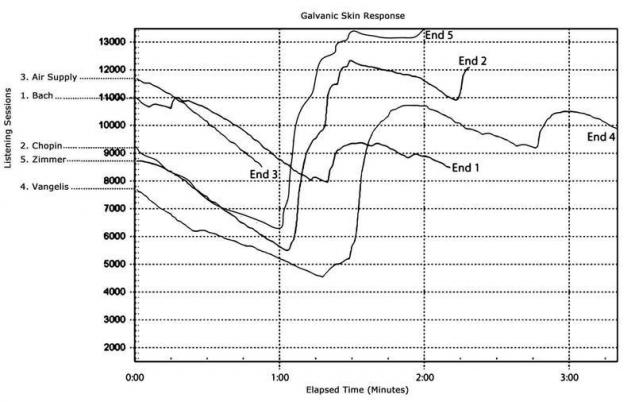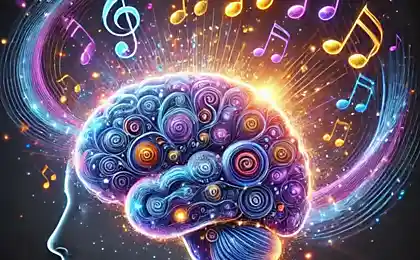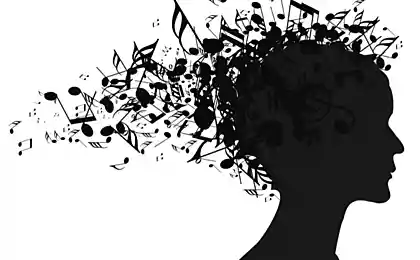150
Why Some People Feel “Emotional Chills” From Music
An ancient temperature trigger in the human brain has tuned in to new inputs.
Trembling, trembling, goose skin, chills, skin orgasm, frission, cold chill in English are all names of the same phenomenon for which there is no established term in the language. Scientifically, these are transcendental psychophysiological experiences, or, more simply, A wave of pleasure that sometimes passes through the skin when listening to some music.
As a trigger, not only music works, but also physical contact with a person, an emotional scene in a feature film, etc. There’s even a community on Reddit where members share “skin orgasm” triggers.

Why is there such a psycho-physiological reaction to emotional stimuli? Why not everyone, but only some people? Scientists have not yet been able to fully study this phenomenon, but half a century of research allows us to make some assumptions.
Amani El-Alayli, a professor of social psychology at the University of East Washington, explains that the cause of emotional chills can be a musical fragment that includes unexpected consonances, sudden changes in volume, or simply an artist’s appearance on stage.
One of the triggers of emotional chills from the Reddit community
Subscribe to our YouTube channel, which allows you to watch online, download from YouTube free video about recovery, rejuvenation of a person. Love for others and for yourself, as a feeling of high vibrations is an important factor in healing.
http://cdn00.vidyomani.com/c/7/2/0/mqarn85ix13w/index.html
Like it, share it with your friends! https://www.youtube.com/channel/UCXd71u0w04qcwk32c8kY2BA/videos
Subscribe - https:/ /www.facebook.com/
Previous scientific studies have identified several pieces of music that most often cause an effect. Here are some of them:
Some physiologists and zoologists suggest that Emotional chills are an evolutionary rudiment left over from our distant (and hairier) ancestors.. They warmed the body by creating an endothermic layer of warm air around the skin directly under the coat (under the skin hairs). That is, the same principle of thermoregulation works here, because of which the inhabitants of hot countries often have curly hair. Coodles protect only the head, and the lifting of hair with a sharp change in ambient temperature protects the whole body at once.
With the invention of clothing, the need for such thermoregulation disappeared, but the trigger itself remained in the brain and somehow retuned to a new set of inputs, namely emotional sensations. Now the effect occurs with a sharp change in emotions, not the temperature of the environment. Accordingly, The trigger is any object that causes a sharp emotional response..
According to various estimates, the effect is experienced by 55% to 86% of the population.
The University of East Washington conducted a large-scale study in which participants listened to the above-mentioned fragments and reported their reaction with the press of a button.

Previous studies have found that people who are more likely to have this effect also show Higher score on the “openness to experience” character test. As it turned out, such people have an unusually active imagination, appreciate beauty and nature, look for new sensations, often deeply immerse themselves in their feelings (reflect) and love diversity in life.
The new study yielded a different result: Here, the frequency of emotional chills is directly related to the degree of immersion in music. In other words, we are talking not so much about the emotional as about the cognitive components of the psychological quality of openness to experience.
The results of a study on the association of emotional chills from music and cognitive abilities of the brain were published April 27, 2016 in the journal Psychology of Music.
Author: Anatoly Alizar
Also interesting: Why you can't say "thank you"
9 Steps to Find Melatonin
P.S. And remember, just changing our consumption – together we change the world!
Source: geektimes.ru/post/276530/
Trembling, trembling, goose skin, chills, skin orgasm, frission, cold chill in English are all names of the same phenomenon for which there is no established term in the language. Scientifically, these are transcendental psychophysiological experiences, or, more simply, A wave of pleasure that sometimes passes through the skin when listening to some music.
As a trigger, not only music works, but also physical contact with a person, an emotional scene in a feature film, etc. There’s even a community on Reddit where members share “skin orgasm” triggers.

Why is there such a psycho-physiological reaction to emotional stimuli? Why not everyone, but only some people? Scientists have not yet been able to fully study this phenomenon, but half a century of research allows us to make some assumptions.
Amani El-Alayli, a professor of social psychology at the University of East Washington, explains that the cause of emotional chills can be a musical fragment that includes unexpected consonances, sudden changes in volume, or simply an artist’s appearance on stage.
One of the triggers of emotional chills from the Reddit community
Subscribe to our YouTube channel, which allows you to watch online, download from YouTube free video about recovery, rejuvenation of a person. Love for others and for yourself, as a feeling of high vibrations is an important factor in healing.
http://cdn00.vidyomani.com/c/7/2/0/mqarn85ix13w/index.html
Like it, share it with your friends! https://www.youtube.com/channel/UCXd71u0w04qcwk32c8kY2BA/videos
Subscribe - https:/ /www.facebook.com/
Previous scientific studies have identified several pieces of music that most often cause an effect. Here are some of them:
- The first two minutes and 11 seconds of Bach's John Passion: Part 1 (Herr, unser Herrscher)
- The first two minutes and 18 seconds of the piano and orchestra concerto No. 1: II
- Air Supply – “Making Love Out of Nothing at All”
- The first three minutes and 21 seconds of a Vangelis piece for NASA’s Mythodea: Movement 6 mission
- The first two minutes of Hans Zimmer's "Oogway Ascends" (used as the soundtrack for Kung Fu Panda)
Some physiologists and zoologists suggest that Emotional chills are an evolutionary rudiment left over from our distant (and hairier) ancestors.. They warmed the body by creating an endothermic layer of warm air around the skin directly under the coat (under the skin hairs). That is, the same principle of thermoregulation works here, because of which the inhabitants of hot countries often have curly hair. Coodles protect only the head, and the lifting of hair with a sharp change in ambient temperature protects the whole body at once.
With the invention of clothing, the need for such thermoregulation disappeared, but the trigger itself remained in the brain and somehow retuned to a new set of inputs, namely emotional sensations. Now the effect occurs with a sharp change in emotions, not the temperature of the environment. Accordingly, The trigger is any object that causes a sharp emotional response..
According to various estimates, the effect is experienced by 55% to 86% of the population.
The University of East Washington conducted a large-scale study in which participants listened to the above-mentioned fragments and reported their reaction with the press of a button.

Previous studies have found that people who are more likely to have this effect also show Higher score on the “openness to experience” character test. As it turned out, such people have an unusually active imagination, appreciate beauty and nature, look for new sensations, often deeply immerse themselves in their feelings (reflect) and love diversity in life.
The new study yielded a different result: Here, the frequency of emotional chills is directly related to the degree of immersion in music. In other words, we are talking not so much about the emotional as about the cognitive components of the psychological quality of openness to experience.
The results of a study on the association of emotional chills from music and cognitive abilities of the brain were published April 27, 2016 in the journal Psychology of Music.
Author: Anatoly Alizar
Also interesting: Why you can't say "thank you"
9 Steps to Find Melatonin
P.S. And remember, just changing our consumption – together we change the world!
Source: geektimes.ru/post/276530/























